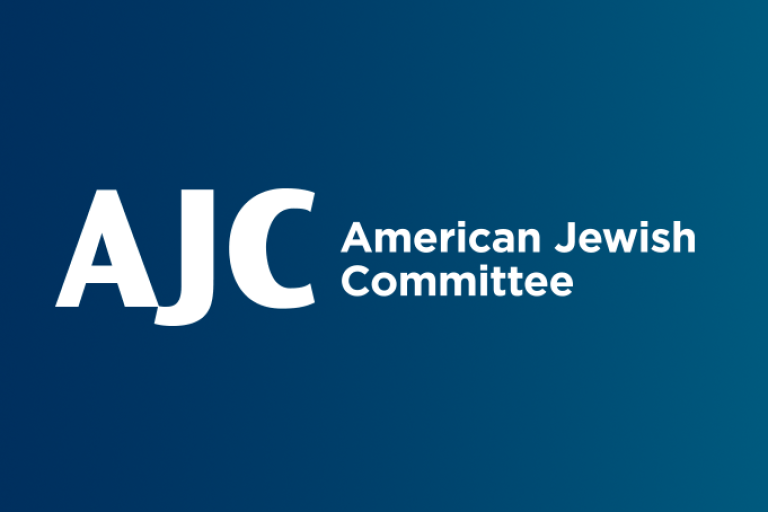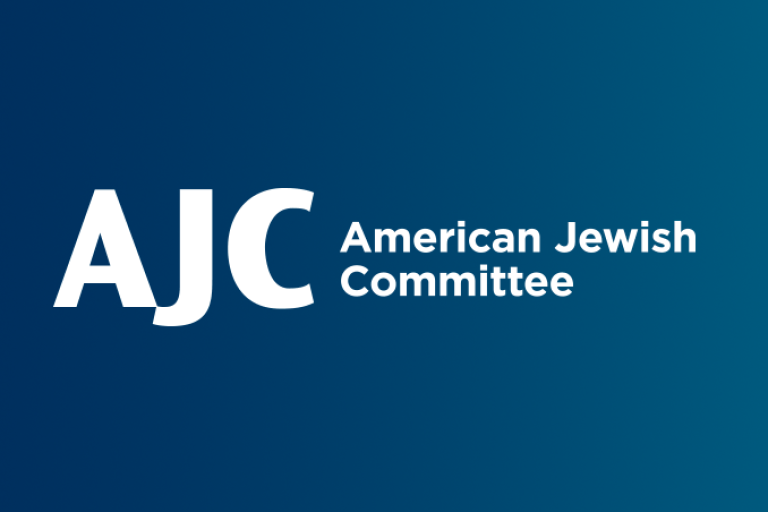June 17, 2022 — New York
This piece originally appeared in The Times of Israel.
What might have seemed unimaginable to many American Jews just a few years ago has now become all too frequent. Anti-Israel, anti-Zionist, and antisemitic incidents are being reported near and far. Those who thought that threats faced by Jews occurred elsewhere in the world, but not here at home, have woken up to new realities.
Underscoring the point, the FBI has reported year after year that Jews constitute a majority of victims of religiously-motivated hate crimes in the country, even as we are just two percent of the population. From the halls of Congress to the streets of New York, from high schools to universities, from a pro-BDS organization in Boston to thugs in Los Angeles, and from social media platforms to local zoning boards, assaults on Jews, accusations of conspiracy-mongering, and demonization of Israel, have been on the rise.
The overarching question is how to respond. There is no one-size-fits-all answer, but here are ten ways to fight back:
First, elected officials should be held accountable for how they react – or fail to react – when Israel is maligned, or Zionism is vilified, or Jews are threatened, or, for that matter, when the IHRA Working Definition of Antisemitism comes up as a proposal for adoption.
Politicians who seek support in every election cycle should understand that these are issues that matter to many voters. They should not be allowed to get away with practiced soundbites or glib phrases when they appear in front of, say, a synagogue, but then take a different stance elsewhere.
Case in point: In the eleven days of fighting last year triggered by Hamas-launched rockets at Israel, some political leaders stepped up to express their support and clear understanding of the story line. But others, including a few who purport to be friends of the pro-Israel community, were missing in action or resorting to late-night whispered comments for fear, in their own minds, they could otherwise potentially jeopardize their careers. That is unacceptable.
Second, institutions need to be held accountable. Some schools and colleges support Jewish and pro-Israel students on campus who feel targeted, whether in the classroom or on the quad, while others have betrayed the trust of those students.
This is not about asking institutions to become full-throated supporters of a particular political stance, but rather ensuring that their environments do not become poisoned by hatred, bigotry, intimidation, bullying, or ostracism. Jewish and pro-Israel students have the right to feel safe, protected, free to express their views, and to be proud of their identity, no less than any others.
If those institutions fail, then they, too, need to be held to account by trustees, alumni, parents, prospective parents, and others. And this doesn’t just apply to educational institution, but equally to the workplace, civic groups, labor unions, and social movements.
Third, show Jewish pride. This is no time for American Jews to become Marrano Jews. We have not experienced the extraordinary journey from 1654, when the first Jews landed on this soil, to now consider, in 2022, removing the mezuzahs from our doors, or kippahs from our heads, or the word “Jewish” from the facades of our institutions, or in any other way seeking cover or hiding under the bed.
To the contrary, exactly like other Americans, we can and should openly affirm our identity, celebrate our remarkable heritage, and remind ourselves of the manifold contributions of Jews to every facet of American society. Our hashtag should always be #JewishANDProud.
Fourth, embrace Israel. Some Jews seem to believe that distancing, if not entirely detaching, themselves from any link with Israel will protect them or, at the very least, endear them to the anti-Israel, anti-Zionist mobs. How tragic that, after nearly 1900 years of Jewish yearning for even a sliver of land, where Jews could govern themselves and not be subject to the whim of the majority, the fact that we live in an era of Jewish sovereignty is not universally valued. No, Israel is not a perfect country. Nor is any other country on earth, including the United States. Still, the story of Israel is awe-inspiring, a metaphor for the triumph of enduring hope over the temptation of despair, and a democratic, progressive beacon in a part of the world with too few counterparts.
Fifth, when it comes to antisemitism, it’s essential to be swivel-headed. This age-old pathology comes from multiple sources. But too many have insisted on a narrower vision, only calling out the threat when it serves their own partisan political preference. So, Jews on the left point their finger at the far right, while Jews on the right point their finger at the far left, when the truth is they’re both correct.
The events in Charlottesville, Pittsburgh, and Poway, not to mention the conspiracy theories peddled by the likes of QAnon, are stark reminders of the real, deadly menace from the far right.
Meanwhile, the daily realities on some college and high school campuses, the mapping of Jewish institutions in Boston by a pro-BDS group, and the recent proposed resolution by seven members of Congress calling Israel’s rebirth in 1948 a “catastrophe,” not to mention the deadly attacks on Jews in Jersey City and Monsey, are stark reminders that not all threats to Jews come from the far right. And no one should forget the ever-present danger of jihadists, as we have seen both in the United Kingdom and U.S., most recently in Colleyville, and it becomes all the more clear that we must have a 360-degree view.
Sixth, focus on young Jews. Insofar as one of the major battlefronts has indeed become educational settings, it’s vital that our children and grandchildren are as prepared as possible for what they may face. Not easy under any circumstance. In the classroom, there is a power imbalance between, say, a hostile professor or teaching assistant, on the one hand, and a student who tries to push back, on the other. A young person bucking the “politically correct” and “intersectional” crowd could easily face social isolation or worse. When it comes to affirming Jewish identity, Zionism, and pro-Israelism, it can require not just confidence in the facts, but also a heavy dose of social courage.
That’s why if we count on young people to stand up and be heard, then we have to help prepare them for the various situations in which they may find themselves. Plus, they need to feel the support of family, Jewish organizations, and Jewish institutions on campus. What’s happening is not just battles over, for example, a boycott, divestment, and sanctions referendum, but, more broadly, a high-stakes fight for the outlook of the next generation of American leaders.
Seventh, antisemitism is not just a Jewish problem. When Jews are targeted as Jews, on the streets, in shops, or at synagogues, the threat is most immediately, of course, directed at Jews. These attacks, however, also need to be seen as assaults on the fabric and fiber of America’s democratic, pluralistic society. In other words, when any minority is threatened, our country as a whole is at risk. To illustrate, the racist killer who drove to Buffalo to kill African Americans also hated Jews, and, according to his written screed, planned to kill them at a later point. There are both real and potential allies out there, who understand the stakes involved, just as there are such allies who recognize that Israel is a key American partner, sharing both values and interests with our country. Hence, it would be shortsighted to try and portray the current challenges we, as Jews, face as if they were Jewish alone. They’re not, and we shouldn’t shortchange ourselves by thinking and acting as if they are.
Eighth, engage partners. Amidst this new sense of vulnerability, let’s be mindful of some basic facts about the U.S. For one thing, poll after poll, year after year, reveal that sizable numbers of Americans support Israel and the U.S.-Israel relationship. Similarly, a number of studies have also shown that Jews are highly regarded among the panoply of American group identities. So, it’s not as if we’re suddenly alone, isolated, and friendless.
Nor is it as if we, the Jewish community, haven’t been a friend to other communities in America over years, decades, and even centuries – whether it’s been in the fight for civil rights and social justice, or overcoming unjust immigration restrictions, or standing up for other targeted or beleaguered communities. True friendships, it should be recalled, must work both ways, all the more so in times of need.
Ninth, learn some basic truths. Sure, the Middle East is an informational minefield, with competing narratives and story lines racing in every direction.
But, none of that should obscure some basic facts, such as: (a) Jews are indigenous to the region, just as Arabs are. (b) The relationship between Jews and this part of the world dates back continuously more than 3,500 years. (c) Israel’s modern-day birthright emanated from the Balfour Declaration, the San Remo Conference, the League of Nations, and the United Nations. How many nations on earth, including a number of Israel’s neighbors, can claim so many layers of legitimacy? (d) The Palestinians could have had a state of their own on multiple occasions, beginning in 1947-8, but instead, tragically, spurned every opportunity. (e) Israel withdrew lock, stock, and barrel from Gaza in 2005, giving the coastal strip its first chance in history to govern itself. (f) By 2007, Hamas, designated a terrorist organization by both the United States and European Union, seized power, ousting violently the Palestinian Authority. (g) The Hamas Charter explicitly calls for the destruction of the State of Israel and accuses Jews, an all-too-familiar conspiratorial trope, of fomenting the French Revolution, the First World War, and the Second World War. (h) Hamas is funded and supplied by Iran, whose leadership openly calls for the annihilation of Israel. (i) Gaza has borders with both Israel and Egypt, and not just Israel, as many allege. (j) Israel is among the most multicultural, multiracial, and multifaith societies on the planet. (k) Israel is a vibrant democracy and Israeli Arabs, who comprise approximately 20 percent of the population, can be found on the Supreme Court, in the Knesset, in the governing coalition, and throughout Israeli society.
And tenth, draw lessons from Jewish history. It should be abundantly clear from Jewish history that antisemites, whether from the far left or the far right, don’t differentiate for long between “good” and “bad” Jews, any more than they would distinguish among “Zionists,” “non-Zionists,” and “anti-Zionists.” Yet, astonishingly, some Jews still don’t seem to have gotten the message. They think they can buy time or space or security by joining in the assault against Israel or even by rationalizing attacks against Jews. Sooner or later, though, as has happened over the centuries, their day of reckoning would come if antisemites ever gained sufficient power again.
Bottom line: There is much we can, must, and should do. The more we can achieve a sense of common purpose – dare I say unity? – the more likely we are to succeed in confronting both the old and new demons we’re facing today.
David Harris is the CEO of the American Jewish Committee (AJC).



